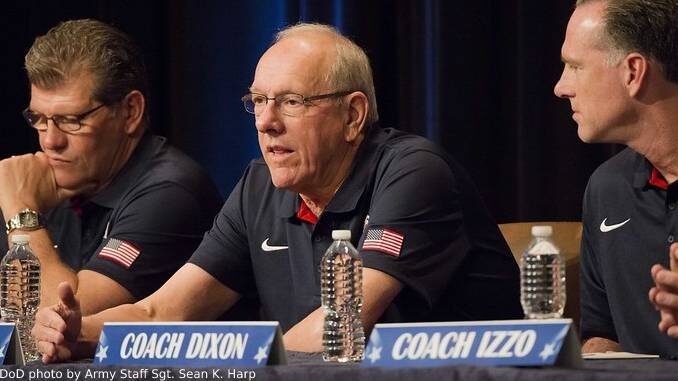
Item: In the Jim Boeheim era dating back to the 1976-77 season, Syracuse basketball teams have competed in games in all but 15 states. With the ongoing pandemic, travel has been restricted. But if society takes a turn back to pre-COVID-19 normalcy before Boeheim retires, and understanding the realities of the big business that is SU basketball and the home game revenue it derives, it would be fun to speculate what it would take to cross off the remaining states on the list.
Below is the state-by-list of where either Boeheim-coached Syracuse teams have competed, or in bold, the states where SU has not played under Boeheim. Also listed is what would have to occur geographically, logistically (easy charter flights), and from a venue capacity standpoint (ticket sale revenue) to make games feasible:
- Alabama: Tuscaloosa
- Alaska: Anchorage
- Arizona: Phoenix, Tucson
- Arkansas: Fayetteville
- California: Los Angeles, San Diego, San Jose
- Colorado: Denver
- Connecticut: Hartford, New Haven, Storrs
- Delaware: Bob Carpenter Center in Newark has a capacity of 5,100
- Florida: Coral Gables, Jacksonville, Miami, Tallahassee, St. Petersburg, Tampa
- Georgia: Atlanta
- Hawai’i: Honolulu, Kaneohe, Lahaina
- Idaho: ExtraMile Arena in Boise has a capacity of 13,390
- Illinois: Chicago, Normal, Rosemont
- Indiana: Indianapolis, South Bend, West Lafayette
- Iowa: The Wells Fargo Center in Des Moines has a capacity of 16,610
- Kansas: Intrust Bank Arena in Wichita has a capacity of 15,750
- Kentucky: Lexington, Louisville
- Louisiana: Baton Rouge, New Orleans
- Maine: Cross Insurance Arena in Portland has a capacity of 6,200
- Maryland: College Park, Landover, (D.C.)
- Massachusetts: Boston, Chestnut Hill, Springfield, Worcester
- Michigan: Ann Arbor, Auburn Hills, Detroit, East Lansing
- Minnesota: Minneapolis
- Mississippi: Gulf Coast Coliseum in Biloxi has a capacity of 11,500
- Missouri: Columbia, Kansas City, St. Louis
- Montana: First Interstate Arena in Billings has a capacity of 12,000
- Nebraska: Omaha
» Related: Can Syracuse’s Elijah Hughes be an NBA First Round pick?
- Nevada: Las Vegas
- New Hampshire: SNHU Arena in Manchester has a capacity of 11,140
- New Jersey: Atlantic City, East Rutherford, New Brunswick, Newark, Piscataway, West Orange
- New Mexico: Albuquerque
- New York: Albany, Buffalo, Hamilton, Ithaca, New York City (Bronx, Brooklyn, Manhattan, Queens), Niagara Falls, Olean, Rochester
- North Carolina: Chapel Hill, Charlotte, Durham, Greensboro, Raleigh, Winston-Salem
- North Dakota: Fargodome in Fargo has a capacity of 19,000
- Ohio: Cleveland, Cincinnati, Columbus, Dayton
- Oklahoma: Chesapeake Energy Arena in Oklahoma City has a capacity of 18,203
- Oregon: Moda Center in Portland has a capacity of 19,393
- Pennsylvania: Hershey, Philadelphia, Pittsburgh, State College, Wilkes Barre
- Rhode Island: Kingston, Providence
- South Carolina: Clemson, Columbia
- South Dakota: The Denny Sanford Premier Center in Sioux Falls has a capacity of 12,000
- Tennessee: Knoxville, Memphis
- Texas: Austin, Dallas, Houston
- Utah: Ogden, Salt Lake City
- Vermont: Gutterson Fieldhouse in Burlington has a capacity of 4,035
- Virginia: Blacksburg, Charlottesville, Norfolk, Richmond
- Washington: Climate Pledge Arena in Seattle has a capacity of 17,459
- West Virginia: Charleston, Morgantown
- Wisconsin: Madison, Milwaukee
- Wyoming: The Casper Events Center in Casper has a capacity of 8,395
For more Syracuse coverage, Like our Facebook page, follow us @TheJuiceOnline and listen to our podcast.

